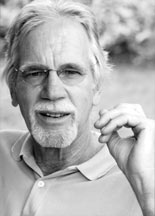Emergency surgery in Kampala, Uganda, saved Gary Smith’s life. In the weeks following, he reflects on God’s presence and his call to be a Jesuit priest.
By Gary Smith, SJ
From They Come Back Singing: Finding God with the Refugees
 That first night out of the clinic, I kept thinking that I hadn’t so much dodged a bullet in my life—again—as been gently moved out of the bullet’s trajectory by that Mystery of love that is beyond all understanding. Each major shift in my life, and each inner awakening, points to God as the author of my existence. I am in God’s hands, and I am—and here is the notion that brings me to my knees—protected.
That first night out of the clinic, I kept thinking that I hadn’t so much dodged a bullet in my life—again—as been gently moved out of the bullet’s trajectory by that Mystery of love that is beyond all understanding. Each major shift in my life, and each inner awakening, points to God as the author of my existence. I am in God’s hands, and I am—and here is the notion that brings me to my knees—protected.
A week after the surgery, I asked Jim, an American Jesuit working in Kampala, to come to my room and sit with me. I didn’t need any words; I told him I just wanted to cry. The pain, trauma, helplessness, and loneliness of the past week had brought me to a breaking point. At that moment, Africa seemed a million light-years away from loved ones. I knew that the anesthesia had plowed into me, disabling those fragile mechanisms that keep me sane and rational. I had been hurled into a depression. The only way over it or through it was to unload with someone I could trust.
I sobbed. From my toes. The hideous past week washed out of me and over me like a rainstorm. It is a stark and empty experience, this business of near death. . . .
How can I explain the extraordinary way in which I was delivered from death? A break, a coincidence, or Providence? Can I dare consider that God acts personally in the direction of my life? Ultimately, I fall back on the fact that there are movements and people and events in my life that I could never have created myself. I just couldn’t—my life is a Wild West story.
Then there is the reality of vocation. It seems clear to me that I have been moved right from the conversion to Christianity to being a Jesuit priest, making my hunt in life one of coming to know, love, and serve Christ. God’s call—that moment, so hidden and natural—is the first sign of divine care and intervention. If vocation is personal—God’s call to me—then why do I run from the possibility that my entire life is personal, that God is moving me, as the Jesuit writer Joseph Tetlow says, momently, in every moment?
This is not triumphant self-absorption; it is simply standing before the evidence and truth of my life. If God is involved in my life, then God is involved in my life—period. God’s love is palpable, transparent, unyielding, inescapable. I have great affection for the Trappists and Trappistines living and praying off in the boondocks. If they have taught me anything, it is that God can break into a person’s life and invite that person to a kind of absurd yes. Yes, I will follow you; yes, I will live in obscurity; yes, I will live at right angles to the world.
What about all the people who do not find God acting personally in their lives? I don’t know the details of their lives, but insofar as I can accompany them and help them understand the Love that impels and surrounds me, I will. If I have been taken care of, then it is to allow me to bring Love once again into the universe—in this case, Africa—by my touch, by my prayer, by my suffering, by my presence. I am too old now to argue with anyone about the validity of this compelling force in my life and the way I see it. One finally has to take oneself into one’s arms and say, This is who I am, and this is the Love that calls me into existence.
Excerpt from They Come Back Singing: Finding God with the Refugees by Gary Smith, SJ.
Related Links
Gary Smith, SJ (Ignatian Voices)
The Making of a Jesuit by Patrick Fairbanks, SJ
